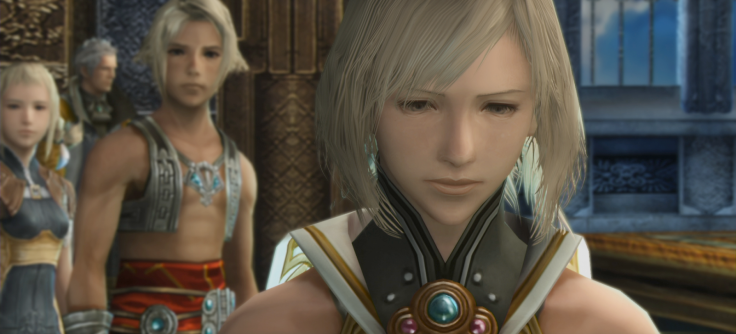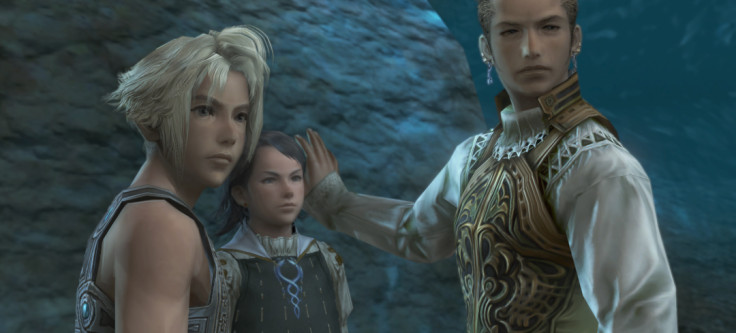Final Fantasy 12: The Zodiac Age producer Hiroaki Kato on remastering a forgotten classic
Hiroaki Kato tackles the tricky subject of "what the fans want from Final Fantasy" with IBTimes UK.
Launching in the twilight years of the PlayStation 2's lifespan, Final Fantasy 12 remains the most polarising entry in the venerable RPG franchise.
To some it represents the pinnacle of the series; a bold reinvention that tore away its restrictive turn-based roots and random encounters for a broader, bolder, more mature adventure with MMO-inspired combat that ditched diatribes about fate and destiny for a more grounded tale of wartime politics and cultural divide.
To others it's the undisputed black sheep of Square Enix's oeuvre.
After an overall positive critical and fan response to the PS4 and PS Vita remaster of Final Fantasy 10 and its direct sequel, the Japanese publisher/developer has reached into the archives once more to bring 12 back to the masses in July in the form of Final Fantasy 12: The Zodiac Age.
The new release brings more party customisation options, improved visuals, and new modes to the table. IBTimes UK played around two hours of the PS4 remaster at a recent event and came away impressed by how well the game has aged and the expansive changes to its systems.
We also had the opportunity to speak to the producer behind The Zodiac Age, Hiroaki Kato, who has been with Square Enix since 2001 and previously acted as project manager for the original Final Fantasy 12 release. We talked to him about 12's impact on the series, the remaster's changes, its characters and much more.
IBTimes UK: The Final Fantasy franchise has gone through multiple reinventions over the past 30 years, which have made each game feel distinct. Can you describe what you feel makes Final Fantasy 12 unique among other games in the series?
Hiroaki Kato [via a translator]: I think there are two main things that make it stick out. The first of those is the world it uses, Ivalice, which is a really detailed and finely created world with its own peoples and cultures. It has its own history as well. It's a very deep and involved world that has been used in a number of different games.
I think the other big thing that sets Final Fantasy 12 apart is its battle system. Obviously up until 12, Final Fantasy battles used a more traditional, turn-based JRPG system that would go from a field exploration section to a battle. With 12 we made that a seamless transition straight into combat, and you also had the Gambit system, which was very unique, where you would create your own AIs for your characters and let them fight automatically.
Speaking of the changes to the battle system and transitions, there are a lot of similarities between Final Fantasy 12 and the eventual direction taken for Final Fantasy 15 – especially with the lack of random encounters and open-world design. How important do you think 12 was for the progression of the series as a whole?
Certainly when we were making the original version of 12 we didn't really think outside of the title itself as a self-contained game. So we didn't think "it would be great if the Final Fantasy series went this way or the other games become more like this", we were trying to create a unique, individual game and what we thought would be fun for the player. It was only after that we came to realise it might have an effect on other things.
For fans in the US and Europe, The Zodiac Age is more than just an HD remaster. Can you tell us about the gameplay changes and improvements we will see?
So in the original Final Fantasy 12 you had the License Board, which was the system you used to grow and develop your characters, but there was only one of those that was shared by the whole party, every character used the same board.
In Zodiac Age you've got a selection of 12 different jobs and each of those has its own unique License Board, so you can choose how each individual party member develops and make them all different.
The second major change is that we completely redesigned and rebalanced every single battle encounter, as well as the treasures you get from each monster and from chests. All of that has been revamped and reworked to make the game better.
And of course the man who has been in charge of the battle-rework design is none other than Hiroyuki Ito who has been in charge of designing the battle systems in so many classic Final Fantasy games in the past.
So I think a [few of the] people playing through the game will make new discoveries, even within the world of 12 they may have seen before and the classic Final Fantasy feeling of adventure. That's going to be a lot of fun for new players and returning players too.

The third change – that I think we put the most focus on [during development] – was making the game more accessible, stress-free, and easier to play. The things we've done are to make the game play in a more comfortable manner and add what people would want from a modern video game.
Shortening loading times is one of them. We've also added a quick saves and auto saves and a double speed mode so you can speed up character movement during certain stages. There's all sorts of little tweaks like this. It's a game with a lot of replay value and a lot to find and explore in the game's world. I think making it a more comfortable and stress-free experience will make people want to dig into it a little more.
I'm quite thankful for some of those changes. I think I lost a good two hours' progress in the original game after dying to a boss!
[Laughs] When we were checking and playing through the original version we had the exact same experience! We understand your pain.
That's good to hear. With the changes mentioned, how difficult was it to balance fan expectation for returning old fans and new players coming to Final Fantasy 12 for the first time?
I think the main point is that the original game was very good in its own right and it had the appeal of the graphics and overall spectacle. So rather than try and fiddle with that and make it seem too far from the original what we really focused on was using the capacity of the modern hardware to make it look as good as it should on a current console.
People who have played the game when it first came out will have slightly rose-tinted memories of the game and remember higher quality visuals than what they actually saw. But that's how people remember games. I think when they see the remaster it'll take the visual level of quality they remember and push that slightly higher. Doing so also means new players who are seeing 12 for the first time will be able to accept it and enjoy it as a modern video game and it won't be below the standard they've come to expect.
Final Fantasy 12 is something of an outlier within the series and has a reputation for being one of the more divisive Final Fantasy games ever, despite impressive reviews and sales. Why do you think this is?
I think it goes back to the revolutionary battle system and moving away from the traditional turn-based system to real-time combat. At that time not that many RPGs used our kind of system, so people who were maybe used to the menu-based battles were turned off by it and thought 'that's not what we want from Final Fantasy'.

On the other hand, some really liked the new system and thought it was the future. I think that's the reason why it polarised fans.
Of course in the modern gaming milieu this type of open-world game is the standard now and has entered the mainstream industry. I think it's a great time to bring it back and what made 12 such a great game should shine through.
You mentioned earlier that the game is set in Ivalice, which also featured in Vagrant Story and the Tactics spin-off series. Do you think there is room for more games to be told in this world?
There's definitely a chance. If we see the reaction to The Zodiac Age and people are really positive about it and say that they want to see more titles set in Ivalice we would very much look into it.
I think there's a good possibility that we will be doing more.
Main character Vaan is something of an anomaly in the Final Fantasy franchise in that he doesn't seem to be tied to a grander destiny and is more of a bystander swept up in the events of the game. He's also one aspect of the game that is criticised the most. What do you make of him?
Ok, so Vaan is the main protagonist in appearance and that's how it is set-up, but really, with the way that the game is designed all six of the main cast are pretty much protagonists in their own right.
They all play a big part in the story, they all have their own backstories and develop throughout the runtime of the game, but if you look at how the whole structure of the story comes together it's really Vaan who create the opportunity for these characters to come together – he's the facilitator of the story in a lot of ways. In that sense he should be the centre of the story.

As for the remaster, the improved graphics have really changed the way we can express the story. It really has ramped up the emotional resonance, especially in the cutscenes. I think playing through the game again you are going to pick up on some of those dramatic moments and character expressions that you may have missed in the original due to the technological limits.
I invite people very much to play the game again with the characters that they like out of the main cast and follow their stories and I think you'll pick up on a few nuances, if only because it's so much more vivid and feels like a completely new experience in a lot of ways.
And finally, with the Final Fantasy 7 remake on the horizon are there any other Final Fantasy games that you would like to see remade or remastered?
[Laughs] I mean, if I was going to think about that seriously for my next project I would really want to see the reaction to The Zodiac Age first.
We also asked the Final Fantasy 12 director, Takashi Katano, about his thoughts on future Final Fantasy remakes or remasters. You can read his intriguing response here.
For all the latest video game news follow us on Twitter @IBTGamesUK.
© Copyright IBTimes 2025. All rights reserved.






















